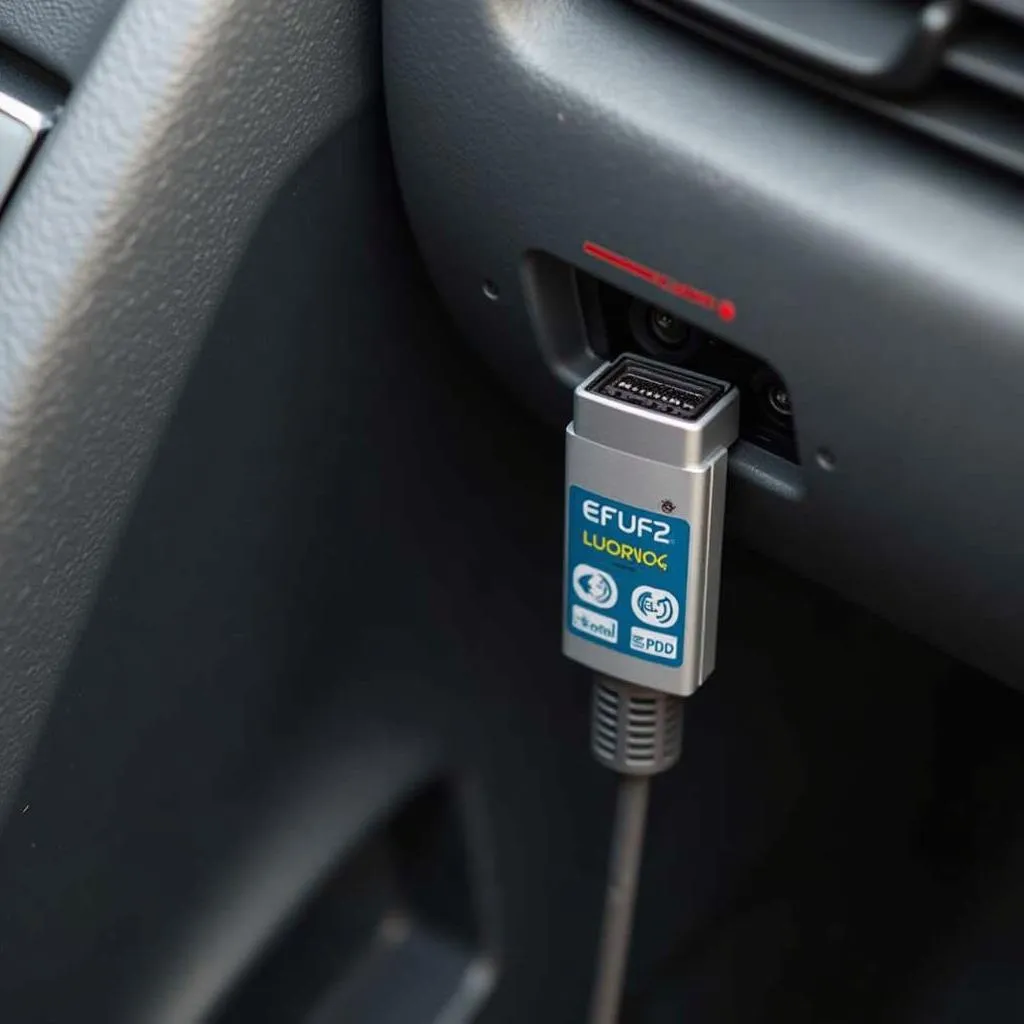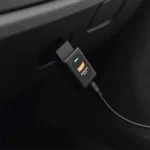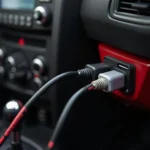The quest for better fuel efficiency is a constant for many car owners. With rising gas prices and increasing environmental concerns, it’s no surprise that devices claiming to improve fuel economy, like Eco Fuel OBD2, have gained significant attention. But does this technology truly deliver on its promises? This article delves deep into the world of Eco Fuel OBD2 devices, examining their functionality, potential benefits, and addressing the common question: do they really work?
Understanding OBD2 and Its Role in Your Car
Before we analyze the effectiveness of Eco Fuel OBD2 devices, it’s crucial to grasp the fundamentals of OBD2 technology. OBD2, short for On-Board Diagnostics, is a standardized system implemented in vehicles since 1996 to monitor and report various aspects of engine performance and emissions. The OBD2 port, typically found under the dashboard on the driver’s side, acts as a communication gateway for external devices like diagnostic scanners.
How Eco Fuel OBD2 Devices Claim to Work
Eco Fuel OBD2 devices, often marketed as “performance chips” or “fuel savers,” plug into your vehicle’s OBD2 port. Manufacturers claim these devices optimize your car’s engine control unit (ECU) by adjusting various parameters such as fuel-to-air ratio, ignition timing, and transmission shift points. By making these adjustments, they supposedly enhance fuel combustion efficiency, leading to improved gas mileage and reduced emissions.
Separating Fact from Fiction: Analyzing the Claims
While the idea of a simple plug-in device significantly boosting fuel economy sounds appealing, it’s essential to approach such claims with a healthy dose of skepticism. Let’s break down some of the common assertions made about Eco Fuel OBD2 devices:
-
Claim: Eco Fuel OBD2 devices can improve fuel efficiency by 15-25%. Reality: Independent studies and consumer reports consistently debunk these inflated claims. While some users may experience minor fluctuations in fuel economy, attributing significant improvements solely to these devices is misleading.
-
Claim: These devices remap your car’s ECU for optimal performance. Reality: Most Eco Fuel OBD2 devices lack the sophisticated technology required to reprogram a vehicle’s ECU. The ECU is a complex system with intricate maps and parameters, and simply plugging in a device is unlikely to achieve significant remapping.
-
Claim: Eco Fuel OBD2 is a one-time investment for long-term fuel savings. Reality: The actual impact of these devices on fuel economy is often negligible, and the cost savings promised rarely materialize in the long run.
The Importance of Evidence-Based Evaluation
When evaluating any product claiming to enhance your vehicle’s performance, relying on verifiable data and independent testing is paramount. Look for reviews from reputable automotive publications and organizations that conduct rigorous testing procedures.
Exploring Alternative Routes to Fuel Efficiency
While the effectiveness of Eco Fuel OBD2 devices remains questionable, there are proven methods to enhance your car’s fuel efficiency:
-
Regular Vehicle Maintenance: Ensuring your vehicle undergoes scheduled maintenance, including oil changes, air filter replacements, and tire pressure checks, can significantly impact fuel economy.
-
Driving Habits: Aggressive driving, rapid acceleration, and frequent braking can dramatically reduce fuel efficiency. Adopting smoother driving habits contributes to both fuel savings and road safety.
-
Tire Pressure: Underinflated tires create more rolling resistance, forcing your engine to work harder and consume more fuel. Maintaining proper tire pressure, as specified in your vehicle’s manual, can improve mileage.
-
Reduce Unnecessary Weight: Carrying excess weight in your vehicle increases fuel consumption. Removing unnecessary items from your trunk or cargo area can contribute to better fuel efficiency.
Conclusion: Choosing Proven Methods for Fuel Savings
While the allure of quick and easy solutions to improve fuel economy is undeniable, it’s vital to approach such claims with a critical eye. Instead of relying on devices with dubious effectiveness, focusing on proven strategies like regular maintenance, responsible driving habits, and choosing fuel-efficient vehicles will yield more tangible and lasting results.
FAQs About Eco Fuel OBD2 Devices
Q1: Do Eco Fuel OBD2 devices void my car’s warranty?
While unlikely, installing aftermarket devices that interact with your vehicle’s ECU could potentially impact your warranty coverage. Consult your vehicle’s warranty terms and conditions or contact your dealer for clarification.
Q2: Are there any risks associated with using Eco Fuel OBD2 devices?
While generally considered safe, using poorly designed or low-quality devices could potentially disrupt your vehicle’s electronics or lead to unexpected issues. It’s crucial to choose reputable brands and consult with automotive professionals if you have any concerns.
Q3: What are some effective alternatives to Eco Fuel OBD2 devices for improving fuel economy?
Proven methods include regular vehicle maintenance, adopting fuel-efficient driving techniques, ensuring proper tire pressure, and reducing unnecessary vehicle weight.
Q4: How can I accurately track my vehicle’s fuel economy?
Reset your trip odometer when you refuel and note the mileage driven and the amount of fuel required for the next refill. Divide the miles driven by the gallons used to calculate your average fuel economy.
Need help choosing the right OBD2 scanner for your needs? Check out our articles on boost obd2 and obd2 sprint booster for detailed information and comparisons.
For insights into reading pre-2009 converters with OBD2 scanners, explore our comprehensive guide: how to read pre 2009 converters for obd2.
Have more questions about OBD2 technology or need assistance with your vehicle diagnostics? Contact us via WhatsApp at +1(641)206-8880 or email us at [email protected]. Our 24/7 customer support team is here to help!


